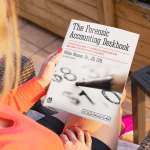Why Lawyers Misunderstand the Consulting Experts’ Role
What does a consulting expert do? Keep secrets. They can be invaluable secret weapons. They can help defend against holes in the case. They can also help advise in the challenge of opposing expert witnesses.

The Forensic Accounting Deskbook by Miles Mason, Sr. JD, CPA, published by the ABA Family Law Section
For a much more detailed discussion, see The Forensic Accounting Deskbook: A Practical Guide to Financial Investigation and Analysis for Family Lawyers, Second Edition, authored by Miles Mason, Sr. and published by the ABA Family Law Section. This updated edition of one the ABA’s most popular resources explains the practice of forensic accounting and business valuation and how to apply it in family law cases. It provides a practice-focused introduction to the core financial concepts in divorce, such as asset identification, classification, and valuation, income determination, expenses, and more.
See Mason’s complete list of the 10 Big Divorce Financial Mistakes.
VIDEO TRANSCRIPT:
Tracy Coenen: Attorneys refer to consulting experts and testifying experts. What’s the difference between the two?
Miles Mason: That’s a great question, and there’s a great diversity of understanding among lawyers, a.k.a. misunderstanding about the difference. A consulting expert provides advice and strategy directly to the attorney and the client and will advise the attorney and client under what’s called the attorney work product exception. Essentially falls under the umbrella of the attorney client privilege. Now, what that allows is that if an expert witness forms an opinion that’s potentially negative to the client or the client’s case, that information can be kept confidential. Once an expert is going to testify on the stand because of the requirement of independence, everything that the expert witness, the testifying expert witness sees, hears, reads, thinks, does, opines, is subject to discovery. That means email, that means drafts, that means notes and meetings. And so it’s very, very important for the forensic accountant and the trial lawyer to work together to make sure they understand what role is being filled.
Tracy Coenen: Does the difference between the two really matter to the expert witness?
Miles Mason: Yes. Because in general, the consulting expert is there to also provide help and assistance on what’s negative about the case, and general testifying expert may only focus on the positive.
Tracy Coenen: What about the file? Is that treated differently? The expert’s file based on whether that expert is a consulting expert or a testifying expert?
Miles Mason: Well, from the expert’s perspective, it should. What we’re looking for, a consulting witness may feel a little bit more free to take notes and put in writing negative aspects about the client’s case, but if the expert may eventually be converted into a testifying expert, not so much, because while once somebody becomes a testifying expert, those negative opinions, those negative thoughts still discoverable, but you may not want to just advertise them through the notes and having them written down. But still, those thoughts and concepts could be discoverable through a deposition question or a trial question.
Thank you to Tracy Coenen, CPA, CFF for inviting me to join her in this video series. Tracy is a nationally recognized forensic accountant practicing in Milwaukee and Chicago.









